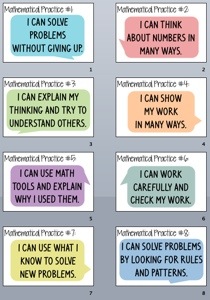One really wonderful thing has come from the Common Core Standards: the 8 Mathematical Practices. Now, whether you love, hate or have no real opinion on the Common Core, please hear me out.
The 8 Mathematical Practices (MPs) are designed to produce good thinking, reasoning, defending and critiquing skills, as well as fostering perseverance (that GRIT
you may have been hearing about), and enforcing the idea of accuracy and attention to detail. These just happen to be the skill sets for success – in any field!
It is my observation that students who lack some or all (and many of the students I am teaching this year lack all) of these skills are struggling with learning.
We can say that this is a problem of laziness, we can blame it on years of spoonfed students, we can fuss about how it is next to impossible to change students’ learning (not completely impossible!), but in the end, we have to simply begin to eat this elephant. I believe that focusing on these 8 MPs will allow us and our students to taste success – of all kinds.
At my school, we are encouraged to be consistent: enforcing student dress codes, the tardy policy, class behavior, and other important policies that affect our students. We talk about success and poster-ize all sorts of great pithy sayings. Then we lament the way the students ignore all the great ideas and opportunities.
Why don’t we get consistent in a very specific way: the 8 MPs. Let’s apply them to every subject and evaluate students on how well they utilize these skills in every applicable assignment. Instead of warm and fuzzy quotes about success, make clear statements about the actual actions we require.
Rubrics are a good start – for you and me! What do these 8 MPs look like for your lesson? What will the student be doing? What will you do to facilitate these actions?
Right now, my class is working with Quadratics. For geometry students, this involves vocabulary (standard form, vertex form, parabola, factoring… All the way to identifying the vertex points x and y, and the roots, zeros, and x- and y-intercepts, depending on the application). There are word problems. There is graphing and interpretations of graphs. All of this comes with multiple steps, plugging answers back in to get the next answer, using a different process to get vertex information, identifying that nasty domain, range, max, min, up, down…. Some of the equations can take a full page, or more. And then we ask them to check their answer (and watch their heads explode as they cry, “this is too much work!” Or the class dissolves into disruption!) Did I mention that they must also decide which answer is reasonable? (Distance and time can’t be negative, right?!?)
All I am saying is that if we review the skills needed to navigate that last paragraph, it is pretty clear that without the MPs, our students will struggle. Yet many teachers remain perplexed as to why the students don’t “get it”, even after repeated, differentiated, broken apart, 1-2-3 lessons. I think by focusing on teaching standards we are missing the more important focus on the learning postures of our students. Don’t get me wrong, we do need to identify the focus of the lesson because the students need to know what success looks like. They also need to know what success feels like, and sometimes that feels like impatience, frustration, and trying again and again, but then again, it will also begin to feel like SUCCESS. (Which can be pretty heady stuff!)
My recommendation for “Eating the Elephant” is the very basic answer of “one bite at a time”:
First bite: post the practices on your wall. (Talk with your students- let them tell you what they think the practices mean, and what this will look and feel like during a lesson.)
Second Bite: before and during a lesson, in addition to talking about the focus of the learning, also identify and recognize the practices that you see your students engaging in. A smile, a thumbs up, an encouraging comment; all go a long way towards motivating and keeping students trying.
Third bite: grade for these practices. Let parents know what we need from Johnny and Suzy. That it’s about more than homework and cramming for a test. It is about more than just being able to work 20 identical algorithms without understanding. It is about giving their kids confidence, mining for that long-buried curiosity that will take them farther than anything else we can do as teachers.
Fourth bite: tell your administrators. Ask them to speak directly to these expectations across all disciplines. Let every student “poster-ize” the practice they think will be the hardest one. Put them across the school instead of the slick marketing slogans that students don’t bother reading. Watch as they say to their friends, “that one is mine. I am working on it. My next poster is gonna be the (insert MP# here)!”
My posters go up Monday. I’ll keep you posted on the results. Oh, and could you please pass the salt?!

